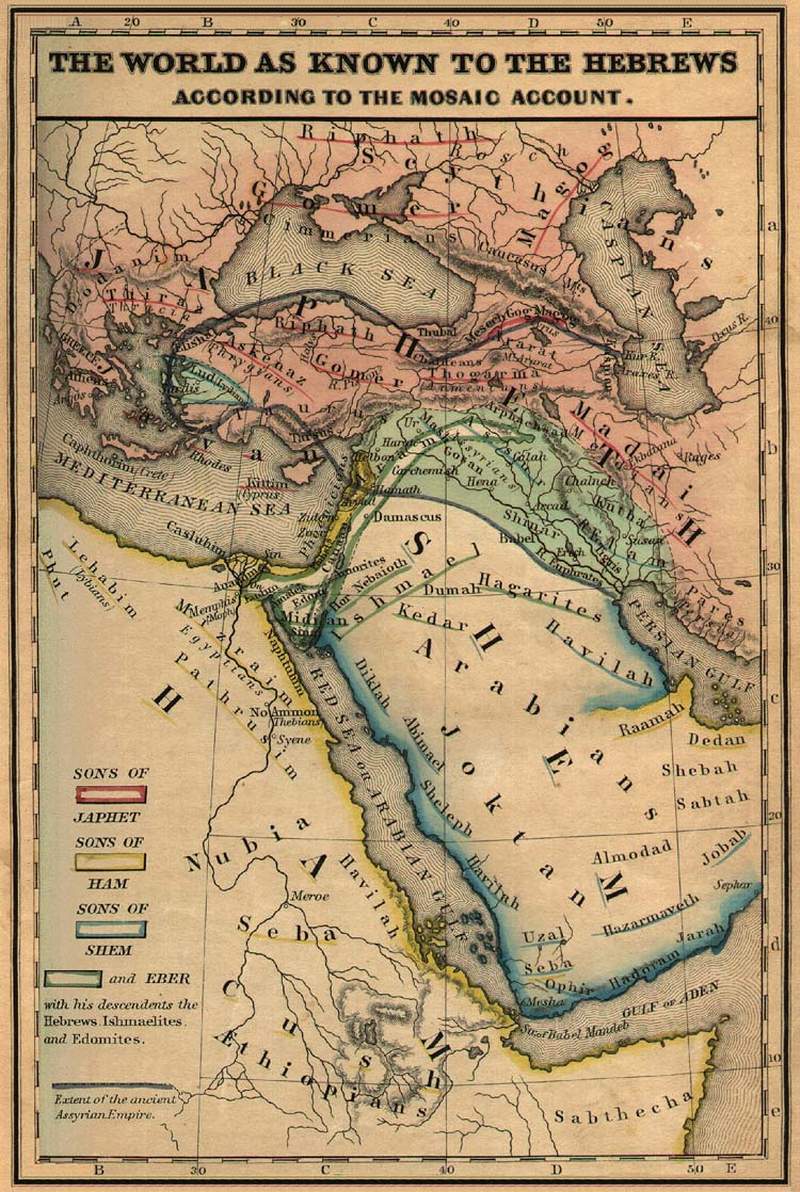Our story
This Chapter
Quibbling about words
History with some salt
A quest for eternal life
Gifts from Sumer
Abraham's sacrifice
Saving babies
The multilayered Bible
Plus a gift from Egypt
A piece of the puzzle
Bibliography
Temper
Footnotes
|
|
"It is written, 'One does not live by bread alone, "A wise man proportions his belief to the evidence." Tiny prologue February 15, 2015, 2015 Unencumbred as I personally am by the reams and reams of scholarly interpretations of the Bible, it strikes me that Matthew 4:4 is a simple, common-sense observation anybody could make: that besides all our day-to-day preoccupation with food, clothing, family, environmental issues, what-have-you, we do have our spiritual side such as concerns about family and others, how well our children are clothed, about whether we do the right things, being haunted by the wrongs we have committed in our pasts, about fear and obligations, about health and mental helth (or call it spiritual wellbeing, if you prefer); we could go on for ever. And that is merely scratching the surface. 3 As for the spiritual side of the book, I'll defer that to another chapter for which I intend to choose the former nun and current Oxford scholar Karen Armstrong as my principal guide. In this chapter, I'd like to make a brief exploration into the Bible as a book of history. 4 It does seem the Bible starts off on the wrong foot: "In the beginning, God created the heavens and the earth." Taking the word of that fabulously prolific author Isaac Asimov, the Hebrew word that has been translated into "God," is Elohim, and that, according to him, is a plural. To be sure, elsewhere I read that the word may be either singular or plural, in other words, those who did their translating from the Hebrew into Greek, etc. either erred or provided us with their own interpretation of the word's meaning. Well they may have been guided by the context of the Biblical stories as they unfold, notably that of the next book, Exodus, which tells us about Moses and his encounters with God, singular, period. But for now, however, we are still in Genesis where we read (2.4), "In the day that the Lord God made the earth and the heavens ...." about which Asimov comments, "The distinctive feature here is the sudden use of the term 'Lord God,' where through the first thirty-four verses the Deity had been referred to as simply 'God'." Asimov continues, "The Hebrew word translated here as 'Lord,' is made up of four Hebrew letters which can be written in English as YHVH and which is expressed, traditionally but mistakingly as 'Jehovah'.... Modern scholars believe 'Yahveh' is the more accurate presentation." And Yahveh, Asimov further explains in some detail, is the very specific name of one of a panthenon of gods. But then again, others differ. * 6 Why did I bother writing that paragraph? My reason is simply that history is easily corrupted, even by those who mean well; and that, be it ancient or modern, it is well to take it all in with a grain of salt. I first learned that lesson in 1940. When I first went to High School (Gymnasium), the Germans had only a few months earlier overrun my country of birth, The Netherlands. First day in school, we had to hand in a few books that, we were told, would soon be returned. And returned they were. My history book, which is still on my shelves, had two pages carefully taken out and replacements pasted in. I guess some history teacher with Nazi sympathies had initiated a process that has made me slightly alergic to any historical writing. And, excuse me, that now includes even the Bible. Besides that, I myself have not always told the truth about events that occurred in my life, and don't even intend to! Plus, and how often haven't we observed that, many allow his/her prejudices or self-justifications or concern for others' reputations override true facts. In a stridently competitive society, self-defence and the protection of others look like sound reasons for occasionally playing footsie with the truth. Differ if you wish, but first give some thought also to those who bandy about the truth merely to sanctimoniously satisfy a lust for malevolent gossip. In short, let not always our yes be our yes. Truth, ultimately, shall be in the mind of the beholder. 7 On a somewhat higher plateau, let's give thought to the "Father of History," the Greek Herodotus, who labored in the fifth cenrury BCE. Herodotus is reputed to be the first historian known for collecting his materials systematically and critically. He wrote about the origins of the Greco-Persian Wars and included a wealth of geographical and ethnographical information. Although some of his stories have been found fanciful and others inaccurate, he stated he was reporting only what he was told. Isn't that just about the best any one person can do? On that note, let's now turn to the patriarch Abraham who came from Ur of the Chaldeans and migrated into the land of Canaan (Genesis 11.31). He came with a group of people, possibly as a caravan merchant although the Bible presents him only as a pastoralist.* I believe it is fair to assume he also brought with him many a story from his old country, among them tales that may have become source material for scribes whose writings have become part and parcel of the Bible. 8 We are given to understand that in the patriarch Abraham's time (~1800–1700 BCE), the Chaldeans did not exist in Mesopotamia (or anywhere else on historical record), that they came into the picture much later, some eight or nine hundred years later. In Abraham's day, therefore, Ur must still very much have been a Sumerian city, possibly with Semites living among the Sumerians. Semitic Abraham may have been, but having been born there or in its close environment, he likely was imbued with Sumerian culture and Sumerian lore. Hence one may perceive a strong link between Sumer and history as found in Genesis—and perceive a stepping stone toward much of the thinking of those who have been keeping the Old Testament stories alive, right up through this very day. Here follow two tidbits that I find quite entertaining, one relating to the Epic of Gilgamesh, the other to a statue found not long ago in Ur. 9 Gilgamesh was king of the Sumerian city Uruk, also known as Erech.* Experts believe this much to be historical. But the Epic of Gilgamesh is more fanciful. It is written on hardened clay tablets, reproduced on many other patties of clay with slightly different versions now existing; the situation is not unlike the many Carolingian saga adorning our memory of the once very real Emperor Charlemagne—such as the legend of Emma's rode (Chapter 9). Here follows from a tablet, now numbered XI, a story told by Utnapishtim, an old, wise man, whom the gods had been granted eternal life. The Gilgamesh of the epic made a very tough journey to Utnapishtim in the hope of acquiring eternal life himself. This is what the old man told him:* 10 Shuruppak, a city that you surely know, situated on the banks of the Euphrates, that city was very old, and there were gods inside it. The hearts of the Great Gods moved them to inflict the Flood. Their Father Anu uttered the oath (of secrecy), Valiant Enlil was their Adviser, Ninurta was their Chamberlain, Ennugi was their Minister of Canals. Ea , the Clever Prince(?), was under oath with them so he repeated their talk to the reed house: 11 "Reed house, reed house! Wall, wall! O man of Shuruppak, son of Ubartutu: Tear down the house and build a boat! Abandon wealth and seek living beings! Spurn possessions and keep alive living beings! Make all living beings go up into the boat. The boat which you are to build, its dimensions must measure equal to each other: its length must correspond to its width. Roof it over like the Apsu ." 12 I understood and spoke to my lord, Ea: "My lord, thus is the command which you have uttered I will heed and will do it. But what shall I answer the city, the populace, and the Elders!" Ea spoke, commanding me, his servant: "You, well then, this is what you must say to them: 'It appears that Enlil is rejecting me so I cannot reside in your city (?), nor set foot on Enlil's earth. I will go down to the Apsu to live with my lord, Ea, and upon you he will rain down abundance, a profusion of fowl, myriad(!) fishes. He will bring to you a harvest of wealth, in the morning he will let loaves of bread shower down, and in the evening a rain of wheat!'" 13 Just as dawn began to glow the land assembled around me—the carpenter carried his hatchet, the reed worker carried his (flattening) stone, ... the men ... The child carried the pitch, the weak brought whatever else was needed. On the fifth day I laid out her exterior. It was a field in area, its walls were each 10 times 12 cubits in height, the sides of its top were of equal length, 10 times 12 cubits each. I laid out its (interior) structure and drew a picture of it (?). I provided it with six decks, thus dividing it into seven (levels). The inside of it I divided into nine (compartments). I drove plugs (to keep out) water in its middle part. I saw to the punting poles and laid in what was necessary. Three times 3,600 (units) of raw bitumen I poured into the bitumen kiln, three times 3,600 (units of) pitch ...into it, there were three times 3,600 porters of casks who carried (vege- table) oil, apart from the 3,600 (units of) oil which they consumed (!) and two times 3,600 (units of) oil which the boatman stored away. I butchered oxen for the meat(!), and day upon day I slaughtered sheep. I gave the workmen(?) ale, beer, oil, and wine, as if it were river water, so they could make a party like the New Year's Festival. ... and I set my hand to the oiling(!). The boat was finished by sunset. 14 The launching was very difficult. They had to keep carrying a runway of poles front to back, until two-thirds of it had gone into the water(?). Whatever I had I loaded on it: whatever silver I had I loaded on it, whatever gold I had I loaded on it. All the living beings that I had I loaded on it, I had all my kith and kin go up into the boat, all the beasts and animals of the field and the craftsmen I had go up. Shamash had set a stated time: "In the morning I will let loaves of bread shower down, and in the evening a rain of wheat! Go inside the boat, seal the entry!" That stated time had arrived. In the morning he let loaves of bread shower down, and in the evening a rain of wheat. I watched the appearance of the weather—the weather was frightful to behold! I went into the boat and sealed the entry. For the caulking of the boat, to Puzuramurri, the boatman, I gave the palace together with its contents. 15 Just as dawn began to glow there arose from the horizon a black cloud. Adad rumbled inside of it, before him went Shullat and , heralds going over mountain and land. Erragal pulled out the mooring poles, forth went Ninurta and made the dikes overflow. The Anunnaki lifted up the torches, setting the land ablaze with their flare. Stunned shock over Adad's deeds overtook the heavens, and turned to blackness all that had been light. The... land shattered like a... pot. All day long the South Wind blew ..., blowing fast, submerging the mountain in water, overwhelming the people like an attack. No one could see his fellow, they could not recognize each other in the torrent. The gods were frightened by the Flood, and retreated, ascending to the heaven of Anu. The gods were cowering like dogs, crouching by the outer wall. Ishtar shrieked like a woman in childbirth, the sweet-voiced Mistress of the Gods wailed: 'The olden days have alas turned to clay, because I said evil things in the Assembly of the Gods! How could I say evil things in the Assembly of the Gods, ordering a catastrophe to destroy my people!! No sooner have I given birth to my dear people than they fill the sea like so many fish!' The gods--those of the Anunnaki--were weeping with her, the gods humbly sat weeping, sobbing with grief(?), their lips burning, parched with thirst. Six days and seven nights came the wind and flood, the storm flattening the land. When the seventh day arrived, the storm was pounding, the flood was a war--struggling with itself like a woman writhing (in labor). 16 The sea calmed, fell still, the whirlwind (and) flood stopped up. I looked around all day long--quiet had set in and all the human beings had turned to clay! The terrain was as flat as a roof. I opened a vent and fresh air (daylight!) fell upon the side of my nose. I fell to my knees and sat weeping, tears streaming down the side of my nose. I looked around for coastlines in the expanse of the sea, and at twelve leagues there emerged a region (of land). On Mt. Nimush the boat lodged firm, Mt. Nimush held the boat, allowing no sway. One day and a second Mt. Nimush held the boat, allowing no sway. A third day, a fourth, Mt. Nimush held the boat, allowing no sway. A fifth day, a sixth, Mt. Nimush held the boat, allowing no sway. 17 When a seventh day arrived I sent forth a dove and released it. The dove went off, but came back to me; no perch was visible so it circled back to me. I sent forth a swallow and released it. The swallow went off, but came back to me; no perch was visible so it circled back to me. I sent forth a raven and released it. The raven went off, and saw the waters slither back. It eats, it scratches, it bobs, but does not circle back to me. 18 Then I sent out everything in all directions and sacrificed (a sheep). I offered incense in front of the mountain-ziggurat. Seven and seven cult vessels I put in place, and (into the fire) underneath (or: into their bowls) I poured reeds, cedar, and myrtle. The gods smelled the savor, the gods smelled the sweet savor, and collected like flies over a (sheep) sacrifice. Just then Beletili arrived. She lifted up the large flies (beads) which Anu had made for his enjoyment(!): "You gods, as surely as I shall not forget this lapis lazuli around my neck, may I be mindful of these days, and never forget them! The gods may come to the incense offering, but Enlil may not come to the incense offering, because without considering he brought about the Flood and consigned my people to annihilation." 19 Just then Enlil arrived. He saw the boat and became furious, he was filled with rage at the Igigi gods : "Where did a living being escape? No man was to survive the annihilation!" Ninurta spoke to Valiant Enlil, saying: "Who else but Ea could devise such a thing? It is Ea who knows every machination!" La spoke to Valiant Enlil, saying: "It is yours, O Valiant One, who is the Sage of the Gods. How, how could you bring about a Flood without consideration Charge the violation to the violator, charge the offense to the offender, but be compassionate lest (mankind) be cut off, be patient lest they be killed. Instead of your bringing on the Flood, would that a lion had appeared to diminish the people! Instead of your bringing on the Flood, would that a wolf had appeared to diminish the people! Instead of your bringing on the Flood, would that famine had occurred to slay the land! Instead of your bringing on the Flood, would that (Pestilent) Erra had appeared to ravage the land! It was not I who revealed the secret of the Great Gods, I (only) made a dream appear to Atrahasis , and (thus) he heard the secret of the gods. Now then! The deliberation should be about him!" 20 Enlil went up inside the boat and, grasping my hand, made me go up. He had my wife go up and kneel by my side. He touched our forehead and, standing between us, he blessed us: "Previously Utanapishtim was a human being. But now let Utanapishtim and his wife become like us, the gods!" 21 Here we have it, one of Sumer's gifts to the Bible!* 22 Was the flood an actual historical event? There are numerous references to an annual flooding of the Euphrates and thereby creating Sumer's fertile soil, but since Noah's ark came to rest way upstream, somewhere in the kingdom of Ararat, speculation exists that a ship may have been carried upward by a tidal bore.* 23 Turning to Genesis 21, God commands Abraham to sacrifice his only son, Isaac, whom he truly loves, as a burnt offering. Abraham, however sorrowful, duly sets out to obey. But at the very last moment, with Isaac already bound on the firewood and Abraham was about to cut his throat, an angel of the Lord called him from heaven and said, "Abraham, Abraham, do not lay your hand on the lad or do anything to him; for now know that you fear God." And when Abraham looked around he saw a ram, caught in a thicket by his horns and offered it up as a burnt offering instead of his son. The rest of the story is told in the caption to the image below: 24 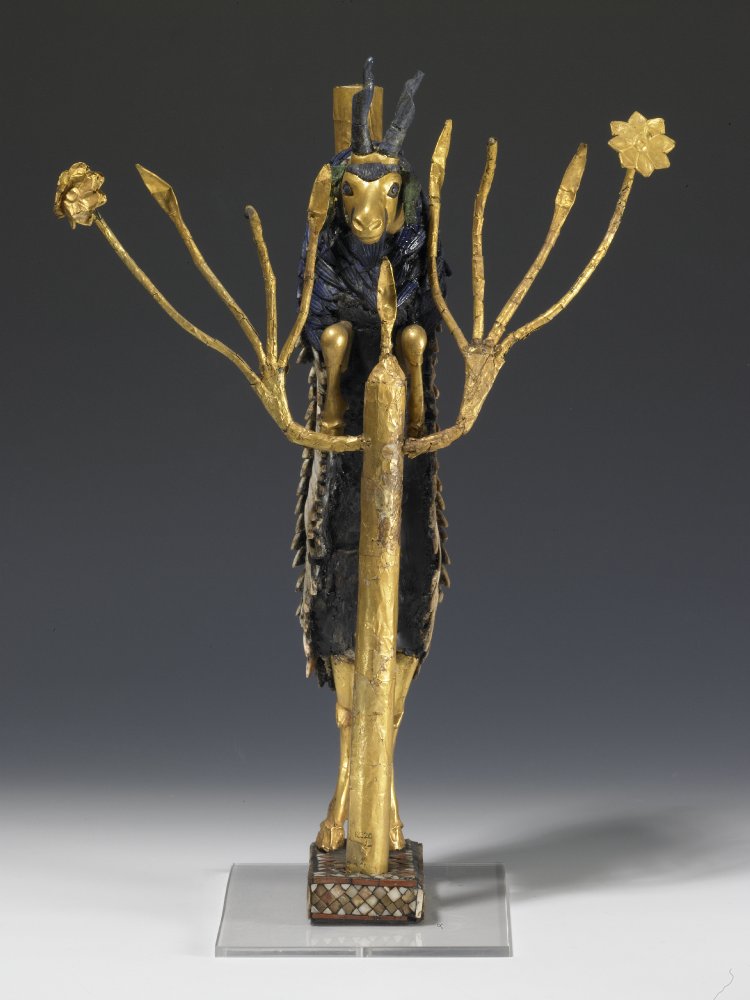 Statuette found by Sir Leonard Woolley in the Royal Cemetery of Ur during an archeological expedition in 1928–1929. Woolley named it "Ram caught in a thicket" because it aptly fits the imagery of the Biblical story of Abraham's sacrifice of his son Isaac (Genesis 22:13). The goat has been identified as a markhor, a wild species native to the mountains of Central and South Asia. The statuette is a quintessential example of early Mesopotamian (Sumerian) composite art, with its rich mix of materials and colors: gold and silver foils, copper, and lapis lazuli. This image, displayed by the University of Pennsylvania Museum of Archeology and Anthropology, is of one of two similar objects found. (Source:). 25 Statuette found by Sir Leonard Woolley in the Royal Cemetery of Ur during an archeological expedition in 1928–1929. Woolley named it "Ram caught in a thicket" because it aptly fits the imagery of the Biblical story of Abraham's sacrifice of his son Isaac (Genesis 22:13). The goat has been identified as a markhor, a wild species native to the mountains of Central and South Asia. The statuette is a quintessential example of early Mesopotamian (Sumerian) composite art, with its rich mix of materials and colors: gold and silver foils, copper, and lapis lazuli. This image, displayed by the University of Pennsylvania Museum of Archeology and Anthropology, is of one of two similar objects found. (Source:). 25Remember Sargon of Akkad mentioned in the previous chapter's Timeline? According to a birth legend in the library of Ashurbanipal dating from the 7th century BCE, he was the illegitimate son of a priestess (older translations describe his mother as lowly). She brought him forth in secret and placed him in a basket of reeds on the river. He was found by Akki the irrigator who raised him as his own son. A similar legend exists about the founders of Rome, Romulus and Remus. A legend has it that they were the sons of a Vestal Virgin who, facing a death penalty, had them placed on the river Tiber. There they were found and nurtured by a she-wolf until a shepherd and his wife raised them further. Similarly, we have the story of Moses, born in Egypt. After the pharao had commanded his people to kill every son born from a Hebrew, Moses's mother hid her three-month old baby in the reeds along the river Nile where he was found by an Egyptian princess who had him nursed and then raised him (Exodus 1:22–2:5). Even further goes the Hindu myth of Karna. His mother called upon the Sun god Surya and was handed a son Karna. Afraid of being an unwed mother, she placed the baby in a basket and set him afloat on a river. The child was found by Adhiratha, a charioteer; he and his wife raised the boy as their own son. This last myth brings to mind the birth of the Egyption god 26 According to a contributor to the scholarly The Oxford companion to the Bible, the books from Exodus to Deuteronomy appear to be edited as a biography of Moses and the historicity of the portrait painted in Exodus through Deutoronomy need be evaluated by several characteristics. One of these is that many of the stories are legendary in character and are built on folktale motifs found in various cultures. The theme of the threatened child who eventually becomes a great figure, for example, was employed from Mesopotamia to Rome and appears in the stories about Sargon the Great, the Greek mythical figures Heracles and Oedipus, Romulus and Remus, Cyrus and Jesus. Another characteristic is duplications in texts, frequently a lack of cohesion of the narratives and of consistency in details. All indicate the material is composite and multilayered. 28 "Composite and multilayered." That leads me to the so-called Documentary Hypothesis by Julius Wellhausen (1844–1918)), a Christian theologian, biblical scholar and orientalist. Based on work by others, he recognized, then chronologically ordered, several sources of the Old Testament's first five books (the Pentateuch) to provide Israel's religious history in a coherent setting. Wellhausen's formulation was: Not everybody agreed. "Of course not," I am tempted to say. Hypotheses are there to be strongly challenged and become theories only after having passed that hurdle. And even then, even theories can be modified or overturned by newer discoveries and insights. My source tells me that the hypothesis has been critiqued and challenged by other models, especially in the last part of the 20th century, but its terminology and insights continue to provide the framework for modern theories on the composite nature and origins of the Torah and Bible compilation in general. Even the Vatican came to urge that the "light derived from recent research" not be neglected by Catholic scholars, urging them especially to pay attention to "the sources written or oral" and "the forms of expression" used by the "sacred writer." Summing it all up, theologians today are all over hell's half acre. 31 And if there is not enough war on the frontlines of theology, we now have the hypothesis/theory/fact about the foundation of Christianity. I understand that theologians and priests need be careful—reputations and livelyhood are at stake. On the one hand, Jesus is posited as a historical figure, on the other, he is the placeholder for a philosophy of life and death that already had been around for many millennia. The (or "a") wellspring for this is found in Egypt. For this chapter, I'll defer to Tom Harpur, a Rhodes scholar, former Anglican priest, professor of Greek and New Testament, writer on religious and ethical issues. In his book, The pagan Christ, which essentially directs itself to lay readers. For introduction, let me quote from the book jacket's flap: "Long before the advent of Jesus Christ, the Egyptians and other peoples believed in the coming of a messiah, a madonna and her child, a virgin birth, and the incarnation of the spirit in the flesh. The early Christian church accepted these ancient truths [sic; I would have preferred the word "beliefs"] as the very tenets of Christianity, but disavowed their origins. What began as a universal belief systemn based on myth and allegory became instead a ritualistic institution headed by ultraconservative literalists.... Our blind faith in literalism is killing Christianity." The Rev. Harpur starts off his book with a quote from St. Augustine, "The very thing which is now called the Christian religion existed among the ancients also, nor was it wanting for the inception of the human race until the coming of Christ in the flesh, at which point the true religion, which was already in existence, began to be called Christian." 32 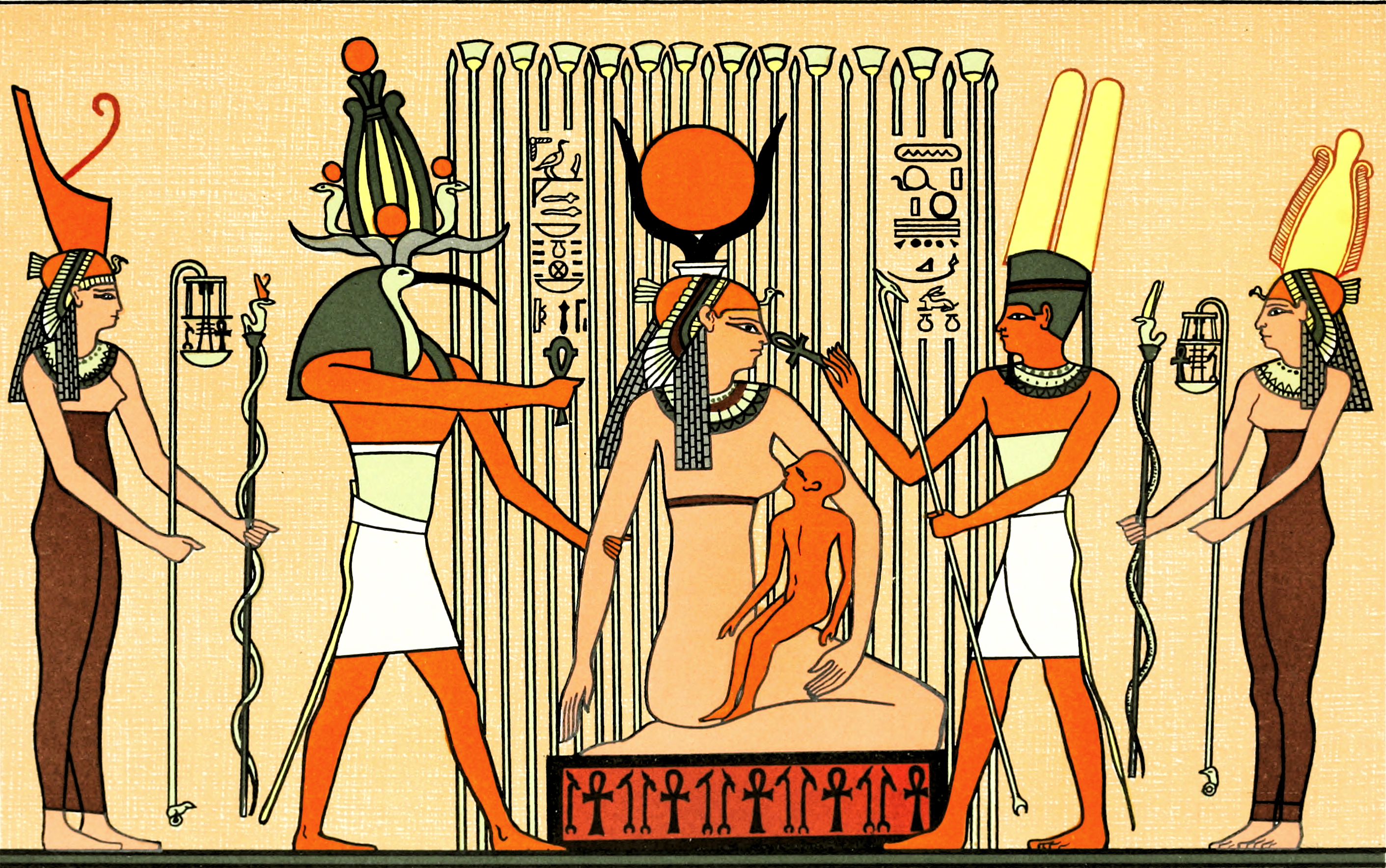 The virgin Isis suckling her divine son Horus (after a drawing by Egyptologist E.A. Wallis Budge). (Source:). 33 The virgin Isis suckling her divine son Horus (after a drawing by Egyptologist E.A. Wallis Budge). (Source:). 33Well, off to the Egypt then. "Like the Christians many milennia later, the ancient Egyptians believed in one God who was self-created, self-existent, immortal, invisible, eternal, omniscient, almighty, and inscrutable; he was the maker of the heavens and the earth, sky and sea, men and women, animals, birds, fish and creeping things, trees and plants and the incorporeal beings who were the messengers (angels) that fulfilled his wish and word." Yes, Harpur explains, we speak of many other Egyptian gods, but the ancient Egyptians did not perceive them as such; what they perceived were certain spiritual aspects of the one God. Particularly important was a divinity in human form whose life in this world as well as the world after was typical of the well-lived life of man. This was the roll of Osiris and of his son Horus, but neither was historical. Mother of the "god" Horus was the virgin Isis (herself very much a cult figure, even well outside of Egypt). From the earliest period on, the Egyptians believed that Isiris was of divine origin; that he suffered betrayal, death, and mutilation at the hands of the powers of evil; and that after a great struggle with these powers, he rose again. And because he had conquered death, the righteous too might conquer death. 34 And yet, and yet! Even though a considerable part of the Bible's historicity has been brought into question, it nevertheless is a book that exerts a great influence over the thinking of billions, agnostics and atheists included. Most people who read the Bible do so for its spiritual and ethical teachings, less for its historical aspects. But Asimov said it well when he wrote, "Nevertheless, for most of the last two thousand years, the Bible has been virtually the only history book used in Western civilization. Even today, it remains the most popular, and its view of anvient history is still more widely and commonly known than is that of any other. So it happens therefore, that millions of people today know of Nebuchadnezzar, and have never heard of Pericles, simply because Nebuchanezzar is mentioned prominently in the Bible and Pericles is never mentioned at all. Millions know of Ahasuerus as a Persian king who married Esther, even though there is no record of such an event outside the Bible. Most of these same millions never suspect that he is better known to modern historians as Xerxes and that the most important event in his reign was an invasion of Greece that ended in utter defeat. That invasion is not mentioned in the Bible. Millions know minor Egyptian pharaos, such as Shishak and Necho, who are mentioned in the Bible, but have never heard of the great conquering pharao Thutmose III, who is not. People whose very existence is doubtful, such as Nimrod and the queen of Sheba are household words because they are mentioned in the Bible, whie figures who were collossal in their day are sunk in oblivion because they are not." 35 Which gives us a sizeable piece of the answer to the question, "What makes us think what we think?" It is a question that leads straight into a next one: "What do we do with the thoughts that come to mind?" That follow-up question shall keep us quite busy when, ten chapters down the line, we begin looking into the Ballenstedts, the Anstenrades and the Merckelbachs. 36 Bibliography
|
|
http://www.usccb.org/bible/understanding-the-bible/index.cfm. The New American Bible includes a number of books not found in the King James version and its subsequent revisions, namely Tobit, Judith, 1 Maccabees, 2 Maccabees, Wisdom, Sirach, and Baruch. * fn0C Wikipedia has a page entirely devoted to the word Elohim. * fn1 Erech is the Greek word for Uruk and it is ancient Greek that transported the Old Testament from Hebrew to modern English. Elohim. * fn2 A number of versions exist. This one has been copied from this site. I first read a Kindle version newly published by Gerald J. Davis, which cost all of US $ 0.99. * fn3 Similarities between the Gilgamesh epic and the Biblical version of the Flood are neatly tabulated here. * fn4 Isaac Asimov, Asimov's guide to the Bible, pp. 39–42: "... a possible explanation for such an invasion by the sea would be the unlucky strike of a large meteorite in the nearly landlocked Persian Gulf. The splash that would result would take the form of a huge wave that might move inland catastrophically sweeping away averything in its path." For a detailed analysis of the Flood, see e.g. this web page. Personally,this scribe very much likes Asimov's book even though it is not intended as a scholarly compendium. For that I keep The Oxford companion to the Bible, edited by Bruce Metzger and Michael Coogan, close at hand. * fn5 |
--
| top of page |
|
Page maintenance:
Page format:monh xx, 2015
Story edit:
To be checked for timeliness:
¶ none
Reminders:
¶ none
Linkcheck: not done
XHTML verify: April 7, 2015
Backups: month. 25, 2011

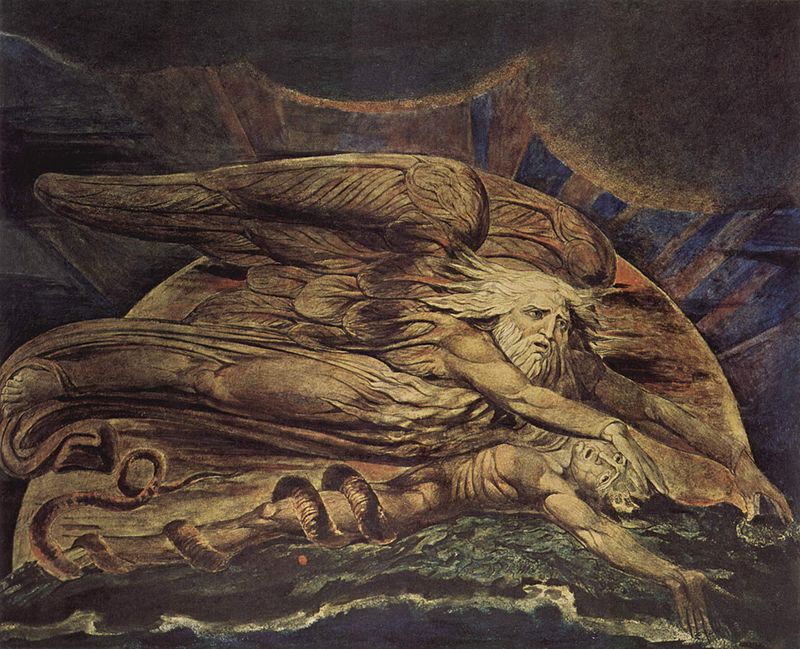 "And Elohim created Adam" by William Blake (1757–1827). (
"And Elohim created Adam" by William Blake (1757–1827). (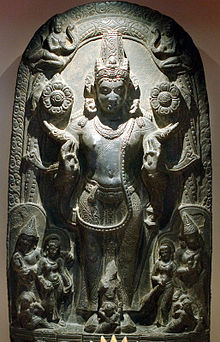 Surya, father of Karna, the Hindu Sun god. (
Surya, father of Karna, the Hindu Sun god. (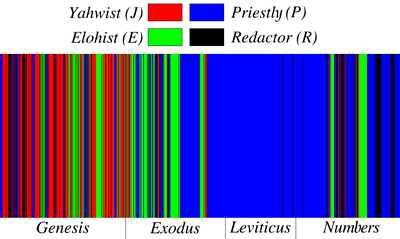 Wellhausen's Documentary Hypothesis.(
Wellhausen's Documentary Hypothesis.(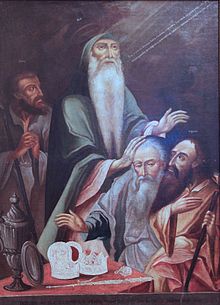 Noah dividing the world between his sons Shem, Ham and Japheth. (Anonymous painter; Russia, 18th century.) (
Noah dividing the world between his sons Shem, Ham and Japheth. (Anonymous painter; Russia, 18th century.) (